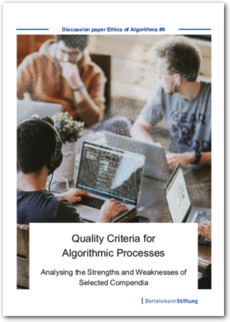Analyzing the Strengths and Weaknesses of Selected Compendia
- Format Type
- Date of publication
- 17/07/2018
- DOI
- 10.11586/2018028
- Edition
- 1. edition
- Volume/Format
- 24 pages, PDF
Format
-
PDF
Price
Free of charge
Description
What should algorithms be allowed to do and what not? What standards of quality should they be held to? For what purposes may they be used? These are relevant questions for all of us as individuals. As a society, we need to achieve a consensus in our response to these questions. The people behind algorithmic processes, that is, those who design these processes, are the most important factor in determining an ethics of algorithms.
Several high-level international working groups, esteemed institutes and associations have already taken on the task of formulating quality criteria for algorithms. The analysis presented here compares three individual quality criteria proposals: the Principles for Accountable Algorithms and a Social Impact Statement for Algorithms (FAT/ML Conference), the Asilomar AI Principles (Future of Life Institute) and the Principles for Algorithmic Transparency and Accountability (ACM U.S. Public Policy Council). This publication is designed to identify the strengths and weaknesses found in each and to highlight those criteria that are transferable to the German-speaking world.




